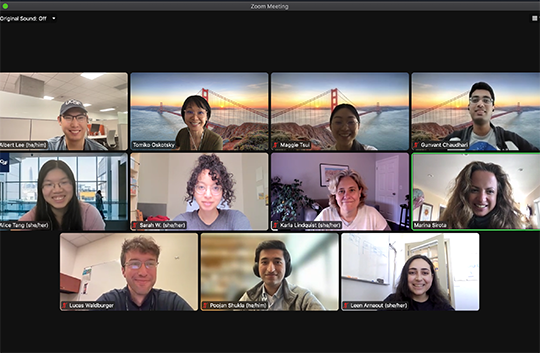UCSF AI4ALL Summer 2022 Wraps Up with Final Symposium
29 talented high school students learned about AI applications in biomedicine.


The Bakar Computational Health Sciences Institute (BCHSI) and Clinical and Translational Science Institute (CTSI), in collaboration with UCSF Health, have selected two Artificial Intelligence/Machine Learning Demonstration Projects for funding, and will support their development and success with newly minted infrastructure available at UCSF for bringing AI into practical use for healthcare delivery.
One awarded proposal of the 21 submitted proposals is “Oncologic treatment history identification and visualization through Apex and Information Commons” by Travis Zack, MD, PhD. The proposal outlines the complexity of oncologic treatment and how the team would use Natural Language Processing (NLP) on the public repository of FDA approved chemotherapy regimens, in conjunction with the UCSF Protocol library, “to develop generalizable tools to accurately identify, temporally bound, and recognize deviations from, standard-of-care treatment regimens in retrospective databases of real-world oncologic treatments.”
“We are very excited to take part in this demonstration project. Our hope is to use this opportunity to streamline oncologist's EMR interactions allowing more time to focus on patients and their needs,” said Zack. “We are also excited to develop decision support tools for shared decision making around the risks of chemotherapeutic treatment for oncology patients here at UCSF.”
The second awarded project is “AI-Guided Clinical Decision Support to Optimize Surgical Blood Transfusions And Minimize Blood Waste” submitted by Priya Ramaswamy, MD. Currently, Maximum Surgical Blood Order Schedules (MSBOS) rely on single surgeon expertise and opinion. This proposal will introduce intraoperative Clinical Decision Support (CDS) for blood bank tests and ordering by clinicians, utilizing a machine learning (ML) approach which considers not only the surgical procedure but also patient medical history, laboratory tests, vital signs, and other real-time data.
“As a soon-to-graduate clinical informatics fellow, I’m grateful to UCSF, honored, and excited to be given the opportunity to work on transforming blood product prediction and governance using AI-guided clinical decision support (CDS),” said Ramaswamy.
“With the support and mentorship from the AI Pilot program leadership, our team hopes to (1) support the blood bank’s responsibility to ensure adequate and timely access to all blood products by arming them with more accurate predictions of short-term needs, (2) implement CDS to guide surgeons, anesthesiologists, and others in choosing appropriate preoperative and intraoperative blood tests and prepare blood product orders to improve patient safety and (3) minimize unnecessary cost and waste of blood tests and/or products.”
The two funded project teams will receive investigator salary support (up to 20% for one year), as well as in-kind support including project management, technical assistance and participation in twice-monthly work-in-progress seminars. Project leadership had to include an active clinician at UCSF treating the clinical problem of interest. Data science and clinical research experience were also review criteria. Project teams will have access to a state-of-the-art data science platform with UCSF health data (Information Commons), design and build services for APeX (APeX-Enabled Research Program), and a new cloud-based platform for deploying AI models in real-time for patient care hosted by UCSF Health Informatics.
AI / Machine Learning Pilots Committee Share Thoughts on the Demonstration Project Proposals
It was incredible to see the active community participation and high quality proposals submitted. This demonstrates UCSF’s growing engagement in creating a next generation Learning Health System by building on and using our expertise in AI, data science and machine learning. But most importantly, these proposals show how researchers, clinicians, and technologists at UCSF can all work together, for the benefit of patients here and worldwide.
Atul Butte, MD, PhD
Director, Bakar Computational Health Sciences Institute
Priscilla Chan and Mark Zuckerberg Distinguished Professor
Support for game-changing technology initiatives involving AI and machine learning is at the core of what CTSI is all about – assisting researchers in the development of tools that accelerate research, and translating new knowledge into practice that improves health.
Harold R. Collard, MD, MS
Associate Vice Chancellor of Clinical Research
Director, Clinical and Translational Science Institute
Making AI useful requires really understanding clinical problems and considering what machine-learned `intelligence’ will actually be useful to clinicians as they deliver care. These two projects were the very best of an excellent batch of submitted applications, and we are thrilled to support them during the coming year along with our Bakar Institute and UCSF Health partners.
Mark Pletcher, MD, MPH
Co-Director Informatics and Research Innovation
Clinical and Translational Science Institute
As UCSF Health Chief Innovation Officer, I look forward to working with project teams to use UCSF’s EHR data for such critical efforts as decision support for minimizing blood waste, and oncologic treatment history identification and visualization. Projects such as these ensure UCSF’s leadership position of leveraging technology to improve clinical care.
Ralph Gonzales, MD, MSPH
Associate Dean for Clinical Innovation
Chief Innovation Officer for UCSF Health